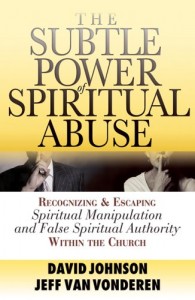 The Subtle Power of Spiritual Abuse, Chapter 13: The Weight of Religion
The Subtle Power of Spiritual Abuse, Chapter 13: The Weight of Religion
We continue our Thursday series blogging through “The Subtle Power of Spiritual Abuse.” The first post in the series is here.
What about the backlash of too much grace? What if we give people too much grace and not enough pressure to perform — won’t that result in chaos?
The chapter begins with a “test” that a church had put in its bulletin, asking people questions such as if they were going to arrive to Sunday School on time next Sunday, with their Bible, having done the lesson, would they bring an offering, attend the worship service, bring a friend? For the score, each question counted as 10 points. If you scored 100 you were a perfect example, if only 60 you were an emergency case.
The question posed: after taking such a test is your spiritual burden lighter or heavier? Are you more tuned in to the voice of the Holy Spirit of the pressure of the pastor?
By the way, the test they offer reminds me of the test offered here. Yikes!
The bottom line for this chapter is, Do we really believe that “amazing grace” works in real life? Is Scripture to be trusted when it says that God will finish the work he has started in someone (Phil. 1:6) or that it is “God who is at work in you, both to will and to work for His good pleasure” (Phil. 2:13), and that if you walk by the Spirit you will not carry out the desire of the flesh (Gal. 5:16)?
Backlash
Johnson recalls that when his church began an emphasis on grace instead of external pressures, there was some fear of the potential backlash — some were concerned that everything would go to chaos. However, as painful as it is to see someone jump into sin, they are acting out what was in their heart all along. Sometimes what is revealed is an unredeemed heart. The issue is that making someone behave might make us feel better, and it might make them look better, but it does not transform the heart. As we remove the manipulation to perform, unredeemed hearts may well jump into sin with abandon.
In another instance, a mom was putting pressure on the pastor to pressure her son to change his friends and lifestyle. She wanted her son to “stand up for his beliefs” but the fact was that he was already standing up for what he truly believed.
As painful as these situations are to see, they are actually better than a shined-up Pharisee who is not truly in life-changing relationship with the Lord.
There is a temptation to use external pressure to accomplish what only God can do inside the heart. Jesus spoke against religious leaders who used such external pressure. In Matthew 23:4, he called them false guides “who tie up heavy loads and put them on men’s shoulders…”
What a sad and stark realization, that someone can disappear under such a heavy load and lose their self, only to find out years later, when the load is stripped away, that they were never in a life-giving relationship with Jesus. On the other hand, when someone does know the Lord, their relationship with him is free to flourish when the load is finally lifted. It is the job of true shepherds to help lift the load, not make it heavier.
Question for discussion: Why do people tend to be afraid of “too much grace”?
There are two common ways that people are saddled with a heavy load: works-based salvation and performance-based Christianity.
Works-based salvation: You carry the weight of both your good works and your bad, hoping that eventually the good outweighs the bad. This would not allow for mercy when you stumble, only encouragement to do more and try harder.
Performance-based Christianity: Many believers accept the truth of Ephesians 2:8–9, that it is not by works that we are saved but by God’s grace. But then they lay on a load of performance for their sanctification. The message of earning salvation by works was rejected, only to be replaced with the message that one must earn one’s way to successful Christian living. Do more, try harder. The difference between a performance-based Christianity and a grace-based Christianity is whether you are being constantly saddled with a burden of performance or whether you are “constantly directed to Jesus as your only hope, encouraged to rest in Him as your only source of life and power.” (p. 151)
Question for discussion: Have you ever felt a load of pressure to do more and try harder in order to obtain a successful Christian walk?
Good Quotes
We believe that “amazing grace” really works (p. 151).
We believe the Holy Spirit of God who lives in them is fully able to [motivate people to obey God] (p. 148)
The goal of spiritually abusive systems is primarily to call people in and keep them in, regardless of whether or not they are finding life there. (p. 151)
Whatever happened to “My load is light and my yoke is easy”? (p. 146)
(Click here to go on to Chapter 14)






















[...] (Click here to go on to Chapter 13) All articles on this site reflect the views of the author(s) and do not necessarily reflect the views of other Recovering Grace contributors or the leadership of the site. Students who have survived Gothardism tend to end up at a wide variety of places on the spiritual and theological spectrum, thus the diversity of opinions expressed on this website reflects that. For our official statement of beliefs, click here. Featured ArticleRG Book Club appearances authority control false teaching grace hypocrisy legalism spiritual abuse standards submission trust [...]